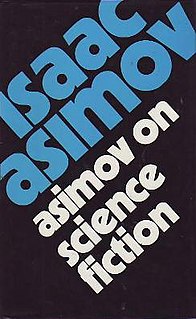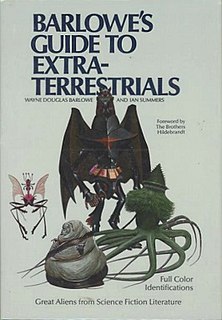 W
WAn Informal History of the Hugos is a 2018 non-fiction book by Welsh-Canadian author Jo Walton. It examines whether the Hugo award nominees were the best five SF and fantasy books of the year, using as reference shortlists from other awards in the genre. It was well-received, and was nominated for the 2019 Hugo and Locus Awards, in the non-fiction category.
 W
WAsimov on Science Fiction (ISBN 0-586-05840-0) is a 1981 non-fiction work by American writer and scientist Isaac Asimov. It is a collection of short essays dealing with various aspects of science fiction. Many of the essays are editorials from Isaac Asimov's Science Fiction Magazine.
 W
WBarlowe's Guide to Extraterrestrials is a science fiction book by artist Wayne Barlowe, with Ian Summers and Beth Meacham. It contains Barlowe's visualizations of different extraterrestrial life forms from various works of science fiction, with information on their planetary location or range, biology, and behaviors, in the style of a real field guide for animals. It was nominated for an American Book Award and for the 1980 Hugo Award for Best Related Work.
 W
WThe Complete Book of Science Fiction and Fantasy Lists is a book written by Malcolm Edwards and Maxim Jakubowski and published in 1983.
 W
WThe Complete Idiot's Guide to Publishing Science Fiction (2001) by Cory Doctorow and Karl Schroeder was published as part of The Complete Idiot's Guide series of non-fiction manuals released by Alpha Books. It was the first non-fiction book by Doctorow, a novelist.
 W
WThe Encyclopedia of Science Fiction (SFE) is an English language reference work on science fiction, first published in 1979. It has won the Hugo, Locus and British SF Awards. Two print editions appeared in 1979 and 1993. A third, continuously revised, edition was published online from 2011; a change of web host was announced as the launch of a fourth edition in 2021.
 W
WEncyclopedia of Science Fiction is a 1978 book of essays about the science fiction genre, largely as a literary form but also covering cinema, TV and illustration.
 W
WL'Encyclopédie du savoir relatif et absolu or Livre secret des fourmis. English: The Encyclopedia of Absolute and Relative Knowledge
 W
West: The Steersman Handbook, Charts of the Coming Decade of Conflict is a work of science fiction cast as a nonfictional study. Its author, credited as L. Clark Stevens, usually went by the name Leslie Stevens. Stevens has a long list of credits in the entertainment industry, having worked on, among other productions, The Outer Limits. The book was published in paperback in 1970, and reprinted in 1971.
 W
WExpedition: Being an Account in Words and Artwork of the 2358 A.D. Voyage to Darwin IV is a 1990 speculative evolution and science fiction book written and illustrated by the American artist and writer Wayne Barlowe. Written as a first-person account of a 24th-century crewed expedition to the fictional planet of Darwin IV, Expedition describes and discusses an imaginary extraterrestrial ecosystem as if it were real.
 W
WGreenworld is a 2010 speculative evolution and science fiction book written by Scottish geologist Dougal Dixon and primarily illustrated by Dixon himself, alongside a few images by other artists. Greenworld has, unlike Dixon's previous works on speculative evolution, only been published in Japan, where it was released in two volumes. The book features a fictional alien planet and a diverse biosphere of alien organisms.
 W
WHow to Build a Robot Army: Tips on Defending Planet Earth Against Alien Invaders, Ninjas, Monsters, and Zombies is a semi-satirical non-fiction book by Daniel Wilson published in December 2007.
 W
WHow to Survive a Robot Uprising: Tips on Defending Yourself Against the Coming Rebellion is a semi-satirical book by Daniel Wilson published in November 2005.
 W
WThe following is a list of maritime science fiction media. Maritime science fiction is a subgenre of science fiction that is considered to have first appeared with Jules Verne's classic 1870 French language novel Twenty Thousand Leagues Under the Sea.
 W
WMan After Man: An Anthropology of the Future is a 1990 speculative evolution and science fiction book written by Scottish geologist Dougal Dixon and illustrated by Philip Hood. The book also features a foreword by Brian Aldiss. Man After Man explores a hypothetical future path of human evolution set from 200 years in the future to 5 million years in the future, with several future human species evolving through genetic engineering and natural means through the course of the book.
 W
WThe Notebooks of Lazarus Long is a 1978 collection of aphorisms by Robert Heinlein's main character, "Lazarus Long", excerpted from his 1973 novel Time Enough for Love. The aphorisms were originally published as two "intermission" sections in the novel.
 W
WRequiem: New Collected Works by Robert A. Heinlein and Tributes to the Grand Master is a retrospective on Robert A. Heinlein (1907–1988), after his death, edited by Yoji Kondo.
 W
WRobota (2003) is an illustrated book by Doug Chiang and Orson Scott Card about a mysterious fourth planet of the solar system named Orpheus. In a time before the events of the book, an alien race known as the Olm came to Orpheus and warned the people, explaining that their planet will crash into Earth in several thousand years. The Olm gave humans very advanced technology and the ability to create robots with artificial intelligence. But over the centuries, entropy and mismanagement have taken their toll. The humans have reverted to a preindustrial existence in a world populated with chimerical beasts such as the saurian jodhpurs, relying on bio-sciences for whatever support they can derive. With their mysterious leader, Font Prime, silenced, the robots have fallen under the baneful influence of Kaantur-Set, who directs a program of human extermination. But the robots themselves are on the point of extinction, as their technologies of reproduction no longer work. In this dire end of times, the story follows the adventures of Caps, a human who wakes up inside a metal capsule with no memory of his past.
 W
WThe Star Trek Star Fleet Technical Manual is a fiction reference book by Franz Joseph Schnaubelt, about the workings of Starfleet, a military, exploratory, and diplomatic organization featured in the television series Star Trek.
 W
WTwentieth-Century Science-Fiction Writers is a book by Curtis C. Smith published in October 1981 on science fiction authors in the 20th century. It is the third in the St. Martin's Press's Twentieth-Century Writers of the English Language series with the others being Twentieth-Century Crime and Mystery Writers and Twentieth-Century Children's Writers.
 W
WThe Visual Encyclopedia of Science Fiction is an illustrated collection of bibliographic essays on the history and subject matter of science fiction. It was edited by Brian Ash and published in 1977 by Pan Books in the UK and Harmony/Crown Books in the US.
 W
WWar with the Robots is a collection of science fiction stories, written by Harry Harrison in 1956–1961. The collection is tied together by a central theme of robots being able to do things better than humans.
 W
WA Wealth of Fable by Harry Warner, Jr., is a Hugo Award-winning history of science fiction fandom of the 1950s, an essential reference work in the field. It is a follow-up to Warner's All Our Yesterdays (ISBN 1-886778-13-2), which covered the 1940s, and helped to earn Warner a Hugo Award in 1969.